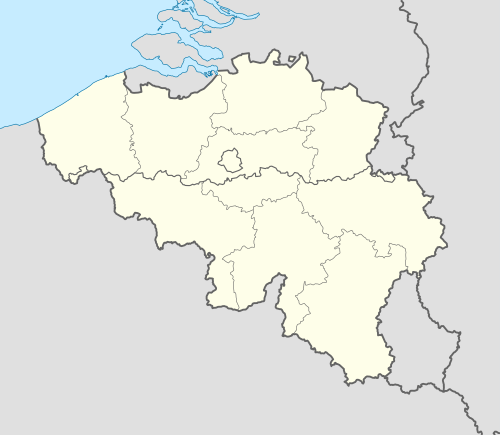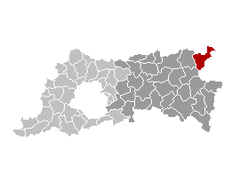Diest
Diest (Dutch pronunciation: [dist]) is a city and municipality located in the Belgian province of Flemish Brabant. Situated in the northeast of the Hageland region, Diest neighbours the provinces of Antwerp to its North, and Limburg to the East and is situated around 60 km from Brussels. The municipality comprises the city of Diest proper and the towns of Deurne, Kaggevinne, Molenstede, Schaffen and Webbekom. As of January 1, 2006, Diest had a total population of 22,845. The total area is 58.20 km² which gives a population density of 393 inhabitants per km².
Diest | |
|---|---|
Diest City Hall | |
 Flag  Coat of arms | |
 Diest Location in Belgium
Diest in the Province of Flemish Brabant  | |
| Coordinates: 50°59′N 05°03′E | |
| Country | Belgium |
| Community | Flemish Community |
| Region | Flemish Region |
| Province | Flemish Brabant |
| Arrondissement | Leuven |
| Government | |
| • Mayor | Christophe De Graef (Open Diest) |
| • Governing party/ies | DDS, Open Diest |
| Area | |
| • Total | 58.20 km2 (22.47 sq mi) |
| Population (2018-01-01)[1] | |
| • Total | 23,824 |
| • Density | 410/km2 (1,100/sq mi) |
| Postal codes | 3290, 3293, 3294 |
| Area codes | 013 - 011 |
| Website | www.diest.be |
History
Between 1499 and 1795 the town was controlled by the House of Nassau (as were Breda in the Netherlands, Dillenburg in Germany and Orange in France) which was also the family of the Princes of Orange who at the end of the Napoleonic Wars became in 1815 the kings and queens of the Netherlands after the termination of the Dutch republic at the hands of revolutionary forces in 1795. The most famous representative of the House of Orange was William I of Orange-Nassau. Also known as William the Silent (1533-1584), who led the revolt of the United Provinces against Spain. His son Philip William - who unlike his father remained a pious Catholic throughout his life - is buried at Diest, and in his will Philip William commanded that the city's parish church of Saint Sulpice should celebrate a yearly Requiem Mass for his soul.
Diest is surrounded by high ramparts, which are partially preserved.
Attractions
Grote Markt: The market place of Diest is surrounded by picturesque houses from the 16th to 18th Century. The town hall is also located here, in the basement of the city museum. Exhibits in the museum include the armour of Philip of Orange and a portrait of René of Orange-Nassau and his wife Anna of Lorraine.
St. Sulpitiuskerk: The church of St. Sulpitius is also located on the Grote Markt. It was built in 1417-1534 from brown sandstone, typical of this period. The grave of Philip of Orange can be found here. After the death of his father William I of Orange-Nassau, he became Lord of the city. In the turret on the church a famous carillon made by Pieter Hemony in 1671.
Town Centre: The house "Hof van Nassau" in the centre is worth a visit, along with Gothic church of Our Lady (built 1253-1288) which has an award-winning pulpit. In the Sint Jan Berchmansstraat you can visit the "Gulden Maan" , the house where St. John Berchmans was born.
Twin towns – sister cities
Diest is twinned with:
Notable people from Diest
- Saint John Berchmans (1599–1621), Jesuit seminarian, born in Diest. A young Jesuit born in Diest and died in Rome in 1621. His tomb is in St. Ignatius Church in Rome. He was canonized in 1888.
- Timmy Simons, footballer, played 82 times for the Belgian national team (as of March 24, 2011)
- Baron Bob Stouthuysen (b. 10 March 1929), businessman.
- Omer Vanaudenhove (1913–1994), liberal politician
- Peter van Diest, writer, probable author of the play Elckerlijc
- Liliane Saint-Pierre, singer.
- The Scabs, rock band of the 1980s and 1990s.
- Philip William of Orange is buried in the church of Saint Sulpice.
- Marleen Renders, Olympic athlete
- Marieke Vervoort, Paralympic Athlete
Images
 Saint Sulpitius church
Saint Sulpitius church Entrance to the beguinage
Entrance to the beguinage Great market
Great market- "Monumental" houses
References
- "Wettelijke Bevolking per gemeente op 1 januari 2018". Statbel. Retrieved 9 March 2019.
External links
| Wikimedia Commons has media related to Diest. |
- . Encyclopædia Britannica. 8 (11th ed.). 1911.
- Official website - Only available in Dutch
- Bookwork about Diest - Only available in Dutch
